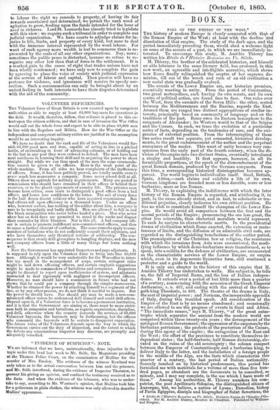VOLUNTEER DEFICIENCIES.
Tax Volunteer force of Great Britain is now counted upon by competent authorities as able to supply at least 60,000 bayonets for operations in the field. It would, therefore, follow, that reliance is placed to this ex-
tent upon the citizen soldiers, and that in case of invasion the War Office would call out the whole force and expect to be able to place 60,000 men in line with the Regulars and Militia. How far the War Office or the
independent and competent military critics are justified in the assumption would be an interesting inquiry.
We have no doubt that the rank and file of the Volunteers would fur- nish 60,000 good men and true, capable of acting in line in a pitched
battle, of skirmishing in front of advancing columns, or of holding out to the last in any post they were ordered to defend. The men have been most assiduous in learning their drill and in acquiring the power to shoot
straight. But while we can thus speak of the men the same commenda- tion cannot be given to the officers. Here is the weak point of the whole machine. From all sides we hear complaints of the inefficiency of officers. Some, it has been publicly proved, are totally unable even to prove much less manoeuvre a company. Some never attend drill at all. Others show no aptitude for military acquirements. Many are posted to commissions who should have remained in their offices or behind their counters, or in the placid enjoyments of country life. The privates soon become keen critics, soon learn to distinguish a good officer from a bad officer, and hence lose confidence in the latter. The salt of every force is the half dozen decent soldiers who have acquired commissions. But bad officers tell upon efficiency in a thousand ways. Under an officer who, however :salons, has nothing of the soldier about him, a company is sure to be irregularly and badly drilled. Men are allowed to fall in and lire blank ammunition who never before loaded a piece. Men who never show but on field days are permitted to stand in the ranks and disgust their comrades by their blunders. Nor is this all. A bad company offi- cer is certain to promote indifferent non-commissioned officers, and thus to cause a further clement of confusion. The same remarks apply to com- manders of battalions who do not sufficiently consult their adjutants, and who have themselves only theatrical notions of soldiership. The con- sequence is that steady drill gives place to bungling displays, and the men and company officers learn a little of many things but learn nothing well.
Now the Government has appointed Inspectors and pays adjutants. It is supposed to rely upon the Volunteer force to bring into line 60,000 men. Although it would be very undesirable for the War-office to inter- fere too much in the management of corps, certain stringent rules might be laid down affecting officers, and certain emphatic suggestions might be made to commanders of battalions and companies. Inspectors might be directed to report upon inefficiencies of system, and adjutants instructed to deal rigorously with negligent or incompetent officers. Moreover, no man should have a commission in future who had not shown that he could put a company through the simpler manoeuvres. Whether he obtained the power by attaching himself to a regiment of the line, or by any other process, we do not think it needful to inquire. But the power he should have. Nor should any man be made a non-com- missioned officer unless he understood drill himself and could drill others. Depend upon it, if a Volunteer force is to become a permanent institution, and it is that the Government are aiming at, there must be more strict- ness both in companies and battalions, as regards organization, discipline, and drill, otherwise when the country demands the services of 60,000 Volunteer bayonets, the bayonets may be forthcoming, but the officers who command the bayonets will be certain to disappoint expectation. The future value of the Volunteers depends upon the way in which the Government carries out the duty of inspection, and the extent to which the defects any conscientious inspector may discover, are promptly and adequately remedied.


























 Previous page
Previous page